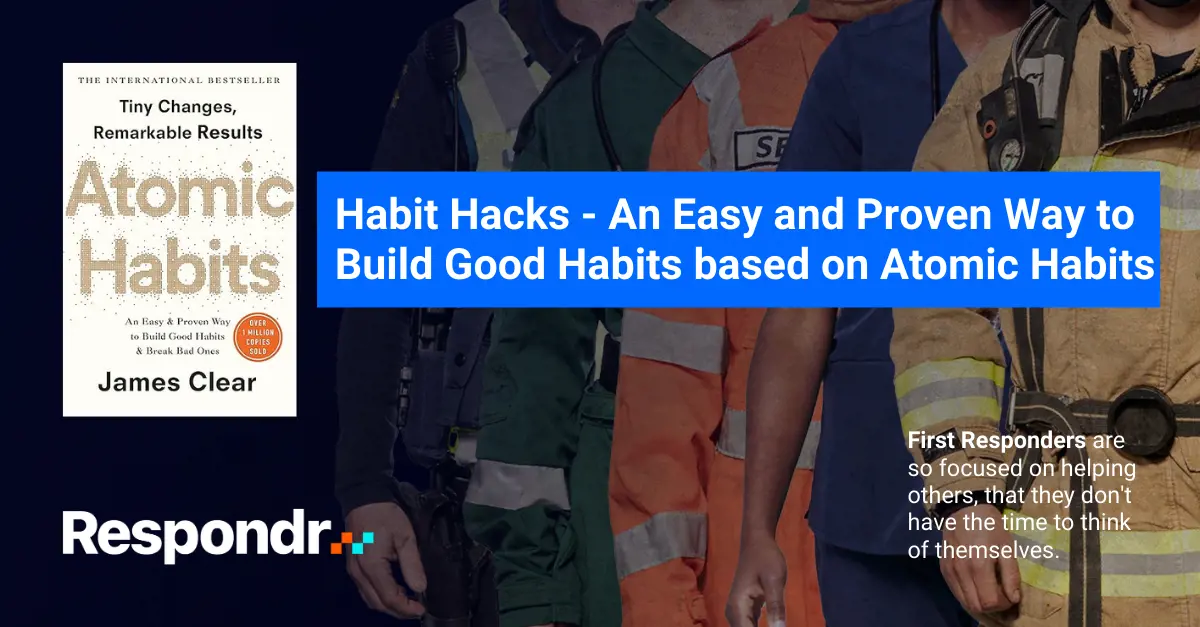
Habit Hacks based on Atomic Habits by James Clear
Published by Respondr 3 min readThe Habit Loop: Building Positive Habits for First Responders
In the dynamic world of first responders, where every moment is critical and every decision can be life-changing, habits play a central role. The concept of the "habit loop," as elucidated by James Clear in his book "Atomic Habits," is particularly relevant. Understanding how habits are formed, the triggers that set them into motion and the rewards they bring can empower first responders to make lasting, positive changes.

The Science of Habit Formation
Habits, whether they're positive or negative, often operate like a well-worn groove in your daily routine. Understanding the science behind habit formation allows you to take control of this loop and direct it toward behaviors that align with your goals.
Cues: Identifying Triggers
Every habit starts with a cue, which is essentially the trigger that initiates the habit loop. As a first responder, your cues can be diverse, stemming from your environment, emotions or routine. Recognizing the cues that prompt certain habits is the first step to making positive changes. For example, if stress triggers unhealthy snacking, acknowledging stress as the cue is the initial stride toward change.
Routines: Replacing Old with New
Once the cue is recognized, it's time to address the routine, which is the habit itself. Identify a new, positive routine that can replace the old one. If late-night unhealthy snacking is your routine when stressed, you might replace it with a routine of practicing deep breathing exercises or engaging in a brief meditation to manage stress more healthily.
Rewards: The Pleasure Principle
Rewards are the pleasurable outcomes that reinforce a habit. Understanding the rewards of both your positive and negative habits is critical. If the reward for unhealthy snacking is stress relief, you can work on finding alternative rewards that are healthier and align with your goals, like a relaxing bath or a brisk walk.
Practical Strategies for Change
As a first responder, adopting new, positive habits can be transformative. The habit loop becomes a powerful tool for shaping your well-being and performance. Start by identifying the cues that trigger your current habits and examining the routines and rewards that follow. Then, consider these practical strategies:
- Mindful Awareness: Regularly practice self-awareness. Acknowledge the cues that trigger your habits, both good and bad. When you're conscious of these triggers, you gain greater control over your responses.
- Plan for Change: Develop a clear plan for replacing old routines with new, positive ones. This plan might include simple, actionable steps to address the cues more healthily.
- Accountability: Share your goals with a trusted friend, colleague or family member. Accountability can be a powerful motivator for sustaining new habits.
- Celebrate Small Wins: Every time you successfully replace an old routine with a new one, celebrate your accomplishment. This positive reinforcement can encourage further progress.
By understanding the habit loop and adopting practical strategies for positive habit formation, first responders can make lasting changes that enhance their well-being, boost their performance and fortify their resilience. In the following articles of this series, we'll explore specific habits tailored to first responders that can have a significant impact on your life and career.